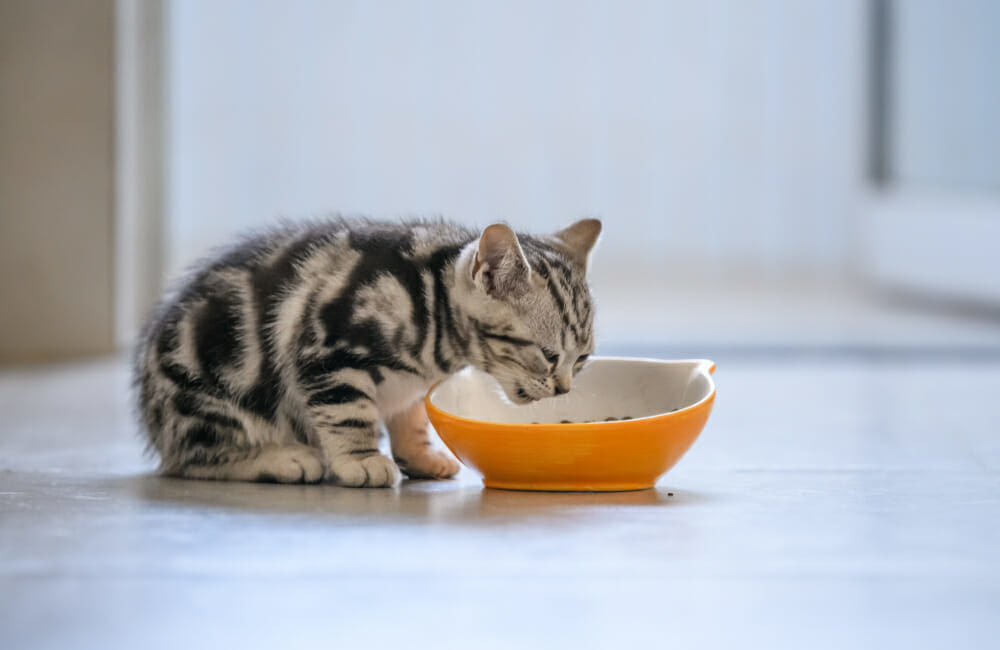Congratulations on your new kitten! As you take on this adventure of kitten ownership, it is important to set your kitten up for long and healthy life. Below are the core aspects of preventative care that all kittens should have to promote their well-being and longevity.
Vaccinations
Vaccinations allow the protection of kittens and cats from preventable infectious diseases that can be potentially fatal.
Core Vaccinations
Note: the schedule below can vary depending on the type of vaccination your veterinarian is administering. Please follow the recommendations of your veterinarian when creating a vaccination protocol for your kitten or cat.
- Rabies – The rabies vaccine is required by law for all owned cats in Ontario. The rabies virus causes a neurological disease that can be lethal to both animals and humans. There is no treatment for a rabies infection. The vaccination is given at 16 weeks of age, then boosted yearly afterwards.
- FVRCP (rhinotracheitis, calicivirus, panleukopenia) – This combination vaccine protects kittens from 3 infectious and potentially deadly diseases. Rhinotracheitis and calicivirus cause upper respiratory infections in cats. Panleukopenia is caused by a virus that attacks
rapidly replicating cells such as those in the bone marrow and gastrointestinal tract. The prognosis for infected kittens is poor. This vaccination is given at 8 weeks, 12 weeks, and 16 weeks of age, then boosted in one year, and then every 3 years after. - FeLV (feline leukaemia virus)* – This vaccine protects kittens from a severe and deadly viral infection that can lead to immunosuppression and cancer development. This vaccination is given as a kitten twice, four weeks apart, commonly at the 12 and 16 week appointments. Boosting thereafter is based on perceived risk. The risk is evaluated by your veterinarian.
*FeLV vaccination is not considered core in cats older than 1 year of age.
Side Effects
It is common for kittens to feel sleepy and have a decrease in their appetite after vaccinations. This should pass within a day. If your kitten has any vomiting, diarrhea, facial swelling or redness or changes to their breathing within 24 hours of the vaccine, you should seek emergency care immediately.
A very rare but important side effect of vaccinations to note in kittens and cats is the feline injection site sarcoma (FISS). FISS are cancerous tumours that arise at the site of injection. A specific cause of this is unknown. If a lump persists at the site of an injection on your kitten or cat, notify your veterinarian.
Viral Testing – FIV and FeLV
Feline immunodeficiency virus and feline leukemia virus are two viruses that can be spread to kittens from their mother, their littermates, or any other cats through bite wounds, secretions, or prolonged close contact. Kittens are at a much higher risk of contracting these viruses than
adult cats. Both of these viruses can result in immunosuppression of the kitten which can lead to death.
Because of the high risk of transmission in kittens and the potential poor outcomes of these infections, viral testing is recommended to detect any underlying infections. The testing is done on a small blood sample collected from the kitten. The test is usually conducted after 6 months of age, as maternal antibodies can impact the test results and can result in a false positive test if done prior to 6 months.
Parasite Prevention
Each kitten or cat has a different level of risk of contracting a parasitic infection or infestation, depending on its lifestyle. The best way to determine what prevention protocol your kitten or cat should be on is to have a conversation with your veterinarian. For example, a kitten
that spends its entire life inside an apartment complex has a very different risk of contracting parasites compared to an outdoor cat. These two scenarios would result in very different parasite prevention protocols.
There are two major categories of parasites that we should protect kittens and cats from external parasites (fleas and ticks) and internal parasites (heartworm and intestinal parasites). The medications to prevent these parasites are dosed on weight, so there should be scheduled monthly weigh-in appointments to monitor your kitten’s growth and to ensure we can send home the appropriate medications. The weigh-in appointments should occur until your kitten reaches their full size.
External Parasite Prevention – Flea and Tick Medication
All cats that spend any time outdoors should be on year-round preventative medication to protect them from fleas and ticks. This is typically a topical medication given every 1-3 months depending on the product. Ticks can be out in the environment in temperatures as low as 4 degrees celsius, therefore year-round prevention is crucial.
- Fleas – small external parasites that live a majority of their life cycle in the environment, and infest animals to lay their eggs and reproduce. Not only can they cause irritation and itchiness of the skin, but they can also transmit intestinal tapeworms to your pet which, can cause diarrhea.
- Ticks – external parasites that can become engorged with blood and appear as a large smooth pimple. Ticks can transmit bacterial diseases that can cause severe chronic systemic illness.
Internal Parasite Prevention – Intestinal Parasite and Heartworm control
- Intestinal parasites (roundworms, hookworms, tapeworms, whipworms, etc.) – Affected kittens typically show symptoms of soft stool, bloody stool, vomiting or diarrhea. It is recommended that your kitten is dewormed every 2 weeks until they are 12 weeks old, then monthly after that until 6 months of age. A stool sample evaluation should be performed at 12-16 weeks of age to screen for any parasites or parasite eggs.
- Heartworm disease – though less commonly diagnosed in cats than dogs, this parasitic infection that is spread through mosquito bites can be lethal. Prevention is achieved through monthly administration of medication, most commonly a topical ointment.
Diet Recommendations
The pet food store can be a daunting place. There are so many options, and of course you want to choose what is best for your kitten! The unfortunate reality is that pet foods are not well regulated, so many companies use marketing to persuade owners into diets that may not be best for their pet. Here are some helpful guidelines when selecting a diet:
- Avoid raw: There are no peer-reviewed published articles that prove that raw diets are superior to traditional kibble diets. Most evidence shows that raw diets should be avoided as they are usually not nutritionally balanced and pose a high risk of bacterial contamination to the cat and all people who interact with it. Cats fed raw diets should not be allowed to interact with any young, elderly, or immunocompromised people for that reason. A kitten fed a raw diet is at a high risk of being nutritionally deficient which, can greatly impair their growth and longevity.
- AAFCO Standards: The American Association of Feed Control Officers (AAFCO) publishes nutritional guidelines for pets. If a diet is meeting the AAFCO standards by clinical trials, it means that the food brand is testing not only that the diets themselves meet the nutritional requirements of cats, but that the cats eating them are able to digest and absorb the nutrients and not be deficient.
- Wet vs Dry: Ideally, a cat should be fed both wet and dry food. This allows them to get the benefits from each type of diet. Dry foods are nutrient-dense and are great for optimizing a cat’s oral and dental health. Wet food diets contain mostly water and provide extra hydration to the cat through the diet.
If you choose to transition your kitten onto a new diet, it is important to do so gradually over the course of a week to ensure you avoid gastrointestinal upset.
Some Recommended Kitten Diets:
• Hills Science Diet Kitten
• Royal Canin Kitten
• Purina Pro Plan Kitten
Whenever considering a new diet, it is best to consult your veterinarian.
Desensitization
Kittens and cats can be very sensitive to stressful situations. It is helpful to expose your kitten to many situations at a young age so they may grow comfortable with them over time.
Examples:
- Leave their blanket and favourite toys in their carrier and keep it out for them to see/use frequently, not just when it is time for a vet visit. This allows them to grow comfortable with entering the carrier and will allow for easier transport to the vet and anywhere else that requires a carrier for transport.
- Desensitize your kitten by handling them as much as possible.
- Playing and handling their paws will allow for easier nail trims.
- Rub their gums with your fingers and open their mouths to facilitate more tolerance when brushing teeth later in life.
- Touching their ears and eyes will desensitize them in case they ever need medications for ear or eye infections.
Helpful Links
- American Association of Feline Practitioners Vaccination Guidelines: https://catvets.com/guidelines/practice-guidelines/aafp-aaha-feline-vaccination
- Feline Leukemia Virus Cornell Summary: https://www.vet.cornell.edu/departmentscenters-and-institutes/cornell-feline-health-center/health-information/feline-health-topics/feline-leukemia-virus
- Feline Immunodeficiency Virus Cornell Summary: https://www.vet.cornell.edu/departments-centers-and-institutes/cornell-feline-health-center/health-information/feline-health-topics/lookout-fiv
- AVMA Vaccines and Sarcomas: https://www.avma.org/resources-tools/pet-owners/petcare/vaccines-and-sarcomas-concern-cat-owners
- American Heartworm Society Feline Guidelines: https://www.heartwormsociety.org/images/pdf/2014-AHS-Feline-Guidelines.pdf
- AVMA Raw Pet Food Policy: https://www.avma.org/raw-pet-foods-and-avmas-policy-faq
- CAPC Vet General Parasite Guidelines: https://capcvet.org/guidelines/general-guidelines/




